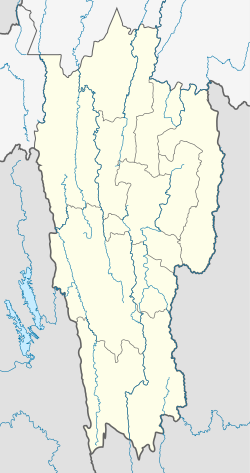Siaha Saiha (Mizo version) | |
|---|---|
Town | |
 | |
| Coordinates: 22°29′N92°58′E / 22.48°N 92.97°E | |
| Country | India |
| State | Mizoram |
| District | Saiha |
| Elevation | 1,225 m (4,019 ft) |
| Population (2023) [1] | |
• Total | 35,500 |
| Languages | |
| • Official | Mara language |
| Time zone | UTC+5:30 (IST) |
| PIN Code | 796901 |
| Vehicle registration | MZ03 |
| Climate | Cwa |
| Website | mizoram |
Siaha (official name given by the Mara Autonomous District Council, [2] popularly known as Saiha) is a town and headquarters of Saiha District and the Mara Autonomous District Council in southern Mizoram, northeast India. It is the fourth most populous town in Mizoram.

